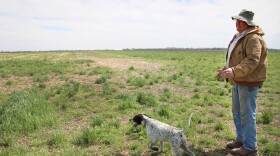-
The United Nations has declared 2023 the International Year of Millets — a type of small grain mostly grown in parts of Asia and Africa. The highly resilient and cost-friendly grains could make them the next crop for U.S. farmers in the midst of climate change.
-
Climate change is making some birds migrate sooner than others to match peak insect populations.
-
A new study shows a threefold increase in Midwest farm acres using the offseason crops to help protect the soil and reduce runoff, but it still makes up less than 8% of all farmland.
-
Accurate weather information is important for farmers, emergency responders and researchers managing extreme conditions. But many monitoring networks are limited by unstable, patchwork funding.
-
A stream revival project at Tower Grove Park helps people in the St. Louis region learn about the Osage Nation while keeping rain runoff from city sewers.
-
Dawn Laybolt is new to the Mark Twain National Forest but not the U.S. Forest Service, having served in various roles at a number of forests over the past 13 years.
-
Midwesterners are becoming more familiar with derechos after two major storms hit the region in as many years. Scientists are grappling with how to define the storms, gather data and predict what the future of derechos will look like.
-
Think of this year’s drought as a sort of dress rehearsal to consider the drier, hotter future that scientists predict climate change has in store. Long-lasting droughts could alter the way we live.
-
From deadly wildfires to choking dust storms to decimated crop harvests, this year’s drought has left its mark across the country. For the hardest hit areas, such as the Great Plains, recovering from the far-reaching impacts of this historically dry year won’t be easy.
-
The Farm Bill, which sets important policy on matters such as crop insurance and SNAP benefits, is up for renewal next year. The results of the midterm elections may not shed much light on how that legislation will end up.
Play Live Radio
Next Up:
0:00
0:00
Available On Air Stations










